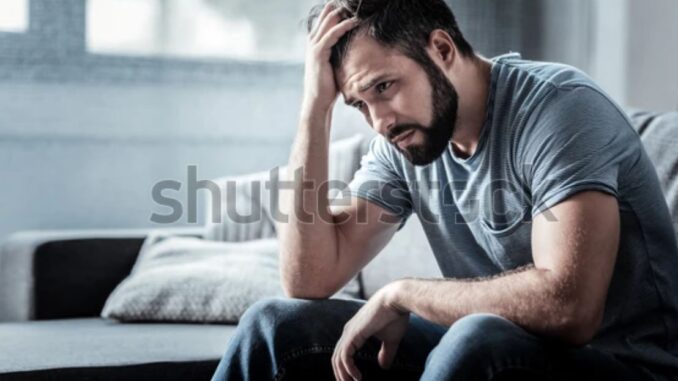
Many say that those of us in prison are more than our worst mistake, that our lives shouldn’t be defined by a single poor decision, especially if it was immediately regretted.
But in reality, I hold myself accountable for what I did. My sense of self, my identity, is forever intertwined with the actions of that day, 28 years ago.
When I look in the mirror, I see a man in his fifties, still fit but well into the second half of life. A man capable of goodness, reflective, and thoughtful. I love to read, enjoy deep conversations, and I’m an accomplished cook. I am a son, brother, and friend.
Yet, I also see the young man who, in a drug-fueled rage, killed the woman he loved. I stabbed her, leaving her in a pool of blood.
That was me. I did that. I ended the life of the woman I claimed to love, the center of my world. I couldn’t bear to let her go, preferring to see her dead rather than living without me.
In truth, I embody the characteristics of a domestic violence abuser.
If you look at my life, you can count the signs. Abused as a child. Nearly killed by my father at 12, abusing drugs and alcohol by 13. Dropped out of school after ninth grade. My mother told me I’d never amount to anything, and deep down, I believed it. Prone to anger, intelligent but manipulative. My family has a violent history—one of my brothers even took his own life while awaiting trial.
I craved love and acceptance, and I would fight if I didn’t receive it.
I met Tracy in a drug treatment program. She had more sobriety time than me, but I could pretend to be someone in recovery, and we fell in love. Being with her made me feel wanted like never before. She became my new addiction. I would look at her in disbelief, thinking, “She’s mine!”
We both had good jobs; I worked as a chef for a museum. We got married. Tracy was spiritual, committed to her sobriety, and always seemed to see things from a higher perspective.
But I never truly quit using drugs, and it wasn’t long before she noticed. She caught me in lies. Her warnings that I couldn’t have both her and the drugs didn’t sink in until she kicked me out. She was right. I was scaring her; I became unpredictable and dishonest when using. My sense of time, place, and judgment disappeared.
My reaction was immature as always: I took more drugs to numb the pain. I blamed her for every bad thing that had ever happened to me.
That day—I wish I could go back and live it again, making different choices, but I cannot. Over the past three decades, I’ve tried to forget, but that memory is burned into my mind.
I went to her house to beg for her to take me back. Did I really believe she would? I knew I scared her, that I wasn’t safe to be with, and that it wasn’t her fault. But in my spiral of rage, I blamed her, and my imagination couldn’t bear the thought of her with someone else.
We argued at her door. She tried to get me out. I pushed past her, grabbed a knife, and attacked her.
I was told that I stabbed her 13 times. The blow to her throat was the fatal one. I fled, hid briefly, and then, with the help of my sisters, turned myself in.
At first, I barely remembered. My mind was hazy—a survival mechanism, like when your body goes into shock. It has taken years for the memories to resurface, and for me to admit my full responsibility.
Initially, I blamed others—my parents, alcohol, drugs, society. Slowly, painfully, I unraveled those excuses and began facing the truth.
Through reading, I found some clarity. In prison, you have time for books, from *The Autobiography of Malcolm X* to Dr. Phil to C.S. Lewis.
An angel named Mrs. Bea Lee from a domestic violence program called the “Duluth Model” helped me recognize the depth of my actions. And after reading about a domestic violence survivor’s story in *The Washington Post*, I started corresponding with Homestretch, an organization that empowered me to realize that, despite my evil deed, I could still bring value to the world.
Now serving a life sentence, I’m unsure if I’ll ever be paroled. I dream of freedom, of walking in nature and cooking with fresh ingredients—things I’ll never do in prison. I’ve developed an appreciation for beauty, love, and goodness.
Yet, forgiveness remains a struggle. Can I forgive myself? I doubt Tracy’s family ever will, and I don’t expect them to. But I owe them the chance to express how I’ve impacted their lives. I am ready for that conversation.
I feel both guilt and shame. Guilt acknowledges a wrong act, while shame is a sense of unworthiness. I have to accept guilt, but I refuse to let shame define me.
I’m more than my worst act, but I still seek atonement. While there’s no perfect way to make amends, I dream of using my story to help other men avoid the same path. If I can save even one person from repeating my mistakes, perhaps I’ll have found my purpose.
I don’t know if I’ll ever leave prison, but among the few choices I have left, I’ve decided to lend my voice to the conversation on empowering women. I speak from the abuser’s side, the man who committed the awful deed but has the experience to warn others before they destroy lives like I did.
I think of King David, who committed murder and begged for forgiveness in Psalm 51: “My sacrifice is a broken and contrite heart, O God, you will not despise.”

Leave a Reply